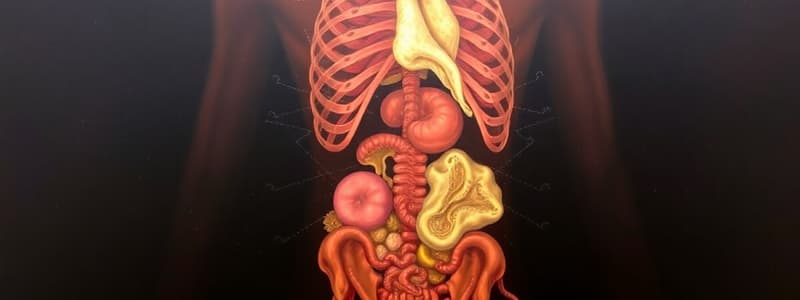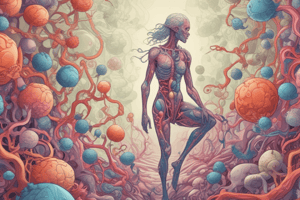Podcast
Questions and Answers
Which system is primarily responsible for regulating bodily functions by releasing hormones into the bloodstream?
Which system is primarily responsible for regulating bodily functions by releasing hormones into the bloodstream?
- Nervous System
- Circulatory System
- Endocrine System (correct)
- Immune System
Which system's primary function involves breaking down food and absorbing nutrients?
Which system's primary function involves breaking down food and absorbing nutrients?
- Immune System
- Digestive System (correct)
- Respiratory System
- Circulatory System
Which of these is NOT a primary function of the immune system?
Which of these is NOT a primary function of the immune system?
- Fighting off infections
- Transporting oxygen to cells (correct)
- Protecting the body from foreign invaders
- Maintaining the body's defense mechanisms
Which system is responsible for facilitating gas exchange between the body and the environment?
Which system is responsible for facilitating gas exchange between the body and the environment?
Which system is primarily responsible for the body's ability to sense and respond to its surroundings?
Which system is primarily responsible for the body's ability to sense and respond to its surroundings?
Which factor is NOT directly related to the human body's physiological responses?
Which factor is NOT directly related to the human body's physiological responses?
Which of these is a primary function of the integumentary system?
Which of these is a primary function of the integumentary system?
Which developmental stage is NOT included in the human life cycle as described in the content?
Which developmental stage is NOT included in the human life cycle as described in the content?
Which tissue type is responsible for providing support and connecting different parts of the body?
Which tissue type is responsible for providing support and connecting different parts of the body?
Which organ system is directly responsible for transporting oxygen and nutrients throughout the body?
Which organ system is directly responsible for transporting oxygen and nutrients throughout the body?
What is the primary function of the endocrine system?
What is the primary function of the endocrine system?
Which of the following is NOT a vital function of the skeletal system?
Which of the following is NOT a vital function of the skeletal system?
Which muscle type is responsible for voluntary movements, like walking or lifting?
Which muscle type is responsible for voluntary movements, like walking or lifting?
The nervous system is responsible for coordinating bodily functions through the transmission of ______.
The nervous system is responsible for coordinating bodily functions through the transmission of ______.
Which of the following is NOT a key component of homeostasis?
Which of the following is NOT a key component of homeostasis?
Which organ system is responsible for removing waste products from the body?
Which organ system is responsible for removing waste products from the body?
Flashcards
Human Body Structure
Human Body Structure
The human body is a system of organs and tissues working to maintain life.
Cell
Cell
The fundamental unit of the human body, specialized in structure and function.
Tissue
Tissue
Groups of similar cells that perform a specific function.
Organ
Organ
Signup and view all the flashcards
Organ Systems
Organ Systems
Signup and view all the flashcards
Homeostasis
Homeostasis
Signup and view all the flashcards
Skeletal System
Skeletal System
Signup and view all the flashcards
Nervous System
Nervous System
Signup and view all the flashcards
Circulatory System
Circulatory System
Signup and view all the flashcards
Respiratory System
Respiratory System
Signup and view all the flashcards
Digestive System
Digestive System
Signup and view all the flashcards
Endocrine System
Endocrine System
Signup and view all the flashcards
Immune System
Immune System
Signup and view all the flashcards
Human Development
Human Development
Signup and view all the flashcards
Aging
Aging
Signup and view all the flashcards
Study Notes
Basic Structure
- The human body is a complex system of interconnected organs and tissues working together to maintain life.
- It consists of various organ systems, each performing specific functions essential for survival.
- The major systems include the circulatory, respiratory, digestive, nervous, musculoskeletal, endocrine, immune, and integumentary systems.
Cells
- The fundamental unit of the human body is the cell.
- Cells specialize in structure and function.
- Different types of cells exist, each with specific roles within the body.
- Various cellular processes are involved in maintaining life, growth, and repair.
Tissues
- Tissues are groups of similar cells working together to perform a particular function.
- Four fundamental tissue types: epithelial, connective, muscle, and nervous tissues.
- Different tissues exhibit distinct characteristics and specific roles in the body.
Organs
- Organs are groups of tissues working together to perform a particular function.
- Organs perform specific tasks, and problems with organs influence health and wellbeing.
- Examples: heart, lungs, stomach, liver, kidneys, brain, etc.
Organ Systems
- Organ systems are groups of organs working together to carry out complex processes.
- Each organ system has specific roles in maintaining homeostasis and overall bodily function.
- Examples: Circulatory system (heart, blood vessels), respiratory system (lungs, airways), digestive system (stomach, intestines), nervous system (brain, spinal cord, nerves), musculoskeletal system (bones, muscles), endocrine system (hormones), immune system (immune cells), and integumentary system (skin).
Homeostasis
- Homeostasis is the body's ability to maintain a stable internal environment.
- This involves constant adjustments to physiological parameters (e.g., temperature, blood pressure, pH).
- Body systems work together to maintain a balance of fluids, nutrients, and other essential components crucial for health.
Skeletal System
- The skeleton provides support and protection for the body.
- It consists of bones, cartilage, and ligaments.
- Bones store minerals and produce blood cells, ensuring structural support and vital function.
Muscular System
- Muscles enable movement, maintain posture, and generate heat.
- Different muscle types exist (skeletal, smooth, cardiac), each tailored to specific bodily functions.
Nervous System
- The nervous system controls and coordinates bodily functions.
- It uses electrical signals and chemical messengers to transmit information throughout the body.
- It is vital for sensory perception, movement, and cognitive functions.
Circulatory System
- The circulatory system transports oxygen, nutrients, and hormones to cells.
- It also removes waste products from cells.
- It includes the heart, blood vessels, and blood.
Respiratory System
- The respiratory system facilitates gas exchange (oxygen and carbon dioxide) between the body and the environment.
- It involves the lungs and associated airways.
Digestive System
- The digestive system is responsible for breaking down food and absorbing nutrients.
- It involves various organs like the stomach, intestines, and liver.
Endocrine System
- The endocrine system regulates bodily functions by releasing hormones into the bloodstream.
- Hormones influence various processes, including growth, metabolism, and reproduction.
Immune System
- The immune system protects the body from foreign invaders (e.g., bacteria, viruses).
- It consists of various cells, tissues, and organs that work together to defend the body.
Integumentary System
- The skin forms the body's outer covering.
- It protects against injury, infection, and dehydration.
- It also regulates body temperature.
Human Development
- Humans undergo various stages of development from infancy to adulthood.
- During each developmental phase, the body experiences specific changes and adaptations in physical and cognitive functions.
- Nutrition, growth factors, and external influences impact human growth and development.
Physical Factors
- Factors like exposure to sunlight, temperature, and pressure are influencing factors affecting the body.
- The body functions best within a specific range of conditions.
Physiological Responses
- The body responds diversely to changes in the environment.
- Examples include maintaining a stable internal temperature, adjusting to different altitudes, and managing shock.
Health and Disease
- Conditions like injuries, infections, and genetic predispositions can cause diseases and malfunctions in various systems.
- The body has mechanisms to fight off illness and heal.
Aging
- Aging is a natural process associated with gradual changes in body structure and function.
- Cells and organs undergo a variety of physiological changes with age.
- Factors such as genetics and lifestyle influence the aging process.
Studying That Suits You
Use AI to generate personalized quizzes and flashcards to suit your learning preferences.




